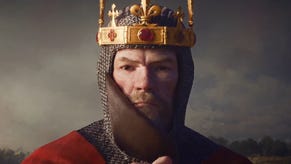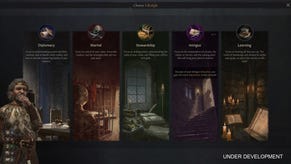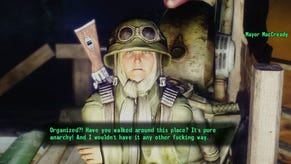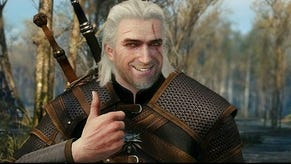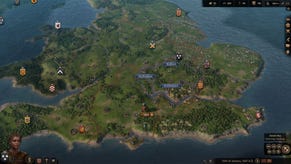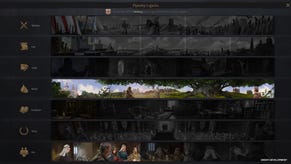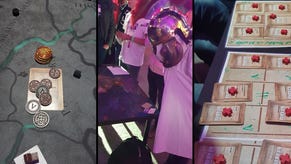On its fifth anniversary, a toast to the humour and humanity of Crusader Kings 2
Hail to the king
Today, on the Big Love Day of Victor Von Valentine, Crusader Kings 2 [official site] celebrates its fifth anniversary. I'm celebrating too because though I love many games, this one has a special place in my heart. I've written about its brilliance before but today I wanted to focus on an aspect that deserves more attention, and that's the way that the game functions as a period piece. With Chaucer and Monty Python as company, I've been thinking about the filth, humour and humanity of this grandest of grand strategy games. And the importance of farts.
The year of Saint Valentine's martyrdom is disputed, but even the latest estimates place it outside the timespan of Crusader Kings II. His beginnings as a hawker of chocolates, flowers and cards are firmly within the game's time period though; one of the earliest surviving references to St Valentine's Day as a time for lovers is in Geoffrey Chaucer's Parlment of Foules, a poetic dream vision about a bunch of birds trying to get laid. Instead of swiping left or right, or trying some speed dating, they perform courtship in the form of a parliamentary debate, which is just about the least sexy thing imaginable.
Nobody leaves satisfied, as far as I can remember, the whole thing being a performance intended to demonstrate various approaches to debate and argument rather than a medieval take on Hatoful Boyfriend. I don't even think there are any fart jokes, which puts it pretty low on the Chaucerian rankings. Who wants to listen to a bunch of bickering birds when you can have this kind of action instead:
“This Nicholas anon leet fle a fart
As greet as it had been a thonder-dent,
That with the strook he was almoost yblent;
And he was redy with his iren hoot,
And Nicholas amydde the ers he smoot.”
If you're struggling with that, here's a translation (search for line 3806), but as long as you understand “fart” and “ers”, you'll get the gist. A man farts so powerfully that he almost blinds another man, who then strikes him on the arse with a hot iron. It gets a bit gruesome then, with sizzling cheeks and broken bones, but all's well that ends well, and everyone's arse is more or less intact by the end.
The farting, which follows on from a literal arse-kissing, is part of The Miller's Tale, a bawdy and farcical story of adultery and violence. It's all a bit Carry On but it serves a purpose: the Miller is telling a tale of dignity undone, of the snooty and mighty brought low, and he's doing so in response to the Knight, whose tale of chivalry and courtly love immediately precedes all of this crude flatulence.
In The Canterbury Tales, Chaucer often lays out an ideal or a stereotype and uses the next tale to undermine it, or question it. That makes him a great commentator on his own time. With no shortage of hot air, he plumps up the fashions and fancies of the day, and then sticks a pin in them. His writing reminds us that so much that we imagine of medieval Europe is drawn from the imaginations of medieval Europeans – in the pageantry and the nobility and the chivalry and the courtly love, we're seeing the aspirational fiction of the day, the glossy magazine advertisements, and the Tatler Magazine spreads, not the reality.
The reality is drinking and eating and working and laughing and lying and cheating and mocking and killing and farting and fucking.
Crusader Kings 2 understands all of that. The five years since release have brought all manner of praise for the emergent storytelling, the scale of its grand strategies and the sheer number of possible scenarios that can be found in its infinitely replayable historical sandbox. It is, to my mind, one of the cleverest combinations of dynamic character-based narratives and actual strategic systems ever committed to code, but on this anniversary I wanted to focus on its excellence as a period piece.
Like Chaucer and Monty Python, Crusader Kings knows that people are people, whenever and wherever they are, and it knows that at this particular point in time those people were filthy. In every sense. Filthy minds, filthy military camps, filthy heresies, filthy homes. Terry Gilliam explained how the realism of the Python's Holy Grail film was an essential part of its humour, as well as an expression of Terry Jones' interest in the actual historical era (which largely came through his reading of Chaucer).
Speaking of the “Bring out your dead” sequence, in which plague victims are gathered on carts, Gilliam says:
"[it's] gorgeous. Shit has never looked so beautiful! And because of that, it's funnier, because it feels so much of a serious movie, a real movie, with real people groveling in the mud, and then 'I'm not quite dead! I'm feeling much better!' It's funnier that way.”
Crusader Kings II is working with similar material. You don't see the dirt, shit and disease, but they're invoked through the text, and, in the case of the sickness, through mechanics. People die horribly and while I've felt anguish when a beloved character suffers and shuffles off this mortal coil, I've laughed far more often than I've grimaced. Like the Pythons, and like Chaucer, Paradox are always prepared to send up their setting and characters with barbed humour or disarming riposte, but that doesn't mean they don't care about the craft that goes into recreating a period or place. In Chaucerian terms, those ripostes are “quites” (from “requite”), responses to previous tales or events that often pack a punch. Or indeed a punchline.
That Crusader Kings creates a sandbox of historical humour and experimentation while dealing with torture, imprisonment, incest, infanticide, religious warfare, discrimination, plague, assassination, betrayal and persecution is remarkable. It does so by taking its setting seriously, both in a scholarly sense and , more importantly, in its treatment of the players in its plots.
In my review, five years ago, I said that Crusader Kings 2 was “the most human strategy game” I'd ever played. It still is, and more so now that its pool of humanity has grown with the addition of new faiths, cultures and people through expansions. As the famous quotation goes: “The past is a foreign country; they do things differently there.” Paradox, on the bizarre and brilliant canvas of the medieval mind, remind us that we can find common humanity among the inhabitants of any foreign country, even one a thousand miles away and a thousand years ago.
They do that not by throwing facts and figures on the screen, but by taking preconceptions of the period, placing them on the stage and then deconstructing them, with laughter and catastrophe. There's nothing more Chaucerian than that.
Paradox are celebrating Valentine's Day with a free South Indian Portrait Pack and big reductions on several of their games, including Crusader Kings II, Europa Universalis IV, Cities: Skylines and Stellaris.







